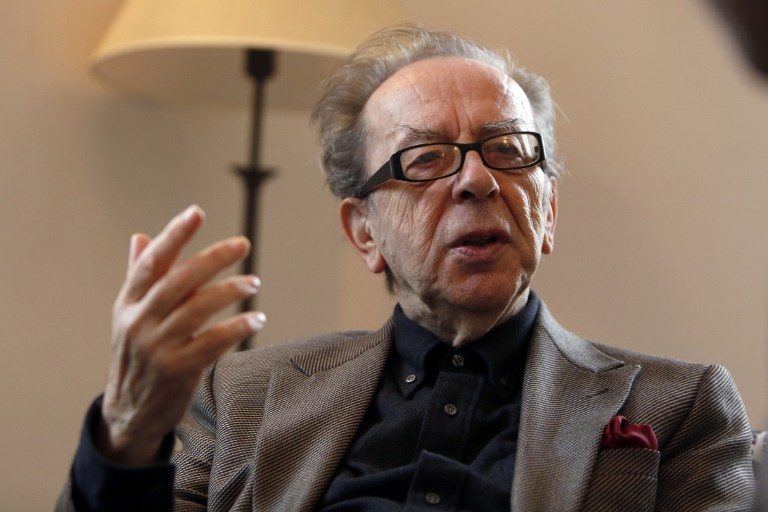TIRANA, January 28
Albanian beloved writer Ismail Kadare celebrates his 85th birthday today. Widely regarded as the most important contemporary Albanian author, Kadare was born in 1939 in the southern city of Gjirokastra, the stone city that’s always there even when not mentioned in many of his works written in different times and places. Gjirokastra is the setting of Chronicle in Stone and many other stories written or rewritten over the years.
Kadare completed high-school in Gjirokastra and later graduated in literature studies at Tirana University and Gorky Institute in Moscow.
He’s renowned for his novels, poetry, short stories, and essays. The literary work of Ismail Kadare has been translated to over 45 languages while he first gained international recognition with his novel ’The General of the Dead Army. In Albania, Kadare began to gain fame with his poems and his first important prose work is ‘The City without Advertisements’ (Qyteti pa Reklama). Kadare is recognized for his storytelling, a unique sense of humor, narrative style, and linguistic capabilities such as lexicon and vocabulary.
Fans and literature enthusiasts can celebrate the 85th birth anniversary of the writer by reading his work or visiting his two house-turned museums in Gjirokastra and Tirana.
The home in the building with cubes, where the Albanian writer Ismail Kadare lived and worked for 15 years, and where he has written some of the most famous books, opened in May 2019. The building was known also as ‘the palace with cubes’ got notoriety during the communist era as it was built by the fellow architect Maks Velo and for that, he got imprisoned for ten years. Entrance to the museum will be free of charge on January 28-29 for Albanian citizens.

To celebrate this important anniversary, here’s a collection of quotes from ‘Chronicle in Stone’ as translated by Arshi pipa’ that go back to the writer’s childhood in Gjirokastra.
- “Everything in the city was old and made of stone, from the streets and fountains to the roofs of the sprawling age-old houses covered with grey slates like gigantic scales. It was hard to believe that under this powerful carapace the tender flesh of life survived and reproduced.”
- “Yes, a very strange city indeed. In some places you could walk down the street, stretch out your arm, and hang your hat on a minaret. Many things in it were simply bizarre, and others seemed to belong in a dream.”
- “The days were heavy and sticky. All identical, one the same as the other. Soon they would even get rid of their one remaining distinction, the shell of their names: Monday, Tuesday, Thursday.”
- “Winter hurled more wind and rain at the city than it ever had before. Clouds dashed about in all directions emptying their thunder, hail and rain. The horizon was choked in fog.”
- “How does the world manage to get in through an eye?”
- “Then Fools’ Alley, as if looking for trouble with other streets, tumbled around the district with sudden, sharp turns.”
- “You can’t understand what a free city means, because you’re growing up in slavery,”
- “I thought there was no greater happiness in the world than to sit smoking after a good meal, listening like Grandpa, with half-closed eyes, to the gypsies playing their violins.”
- “Grandma always smelled like fresh bread, and whenever I got hungry, I always thought of her, with her milky complexion and her spreading shape which set the old joists of our house groaning, as if to protest: “Ouch! Grandma, you’re crushing us, and we can’t take any more.”
- “There were all kinds of things in our big house: copper cauldrons, plates of all sizes, bread bins, mortars, iron hooks, beams, steel balls (one was supposed to be a cannonball), barrels, chests with dates painted on them, all sorts of buckets, pitchers, and ewers, a rifle with a butt inlaid with mother-of-pearl, a whole clutter of strange old things including a trough for slaking lime — but not a single book. Apart from a torn and yellowing manual of dream interpretation, there wasn’t a single sheet of printed paper in the house.”
- “I couldn’t get to sleep. The book lay nearby. Silent. A thin object on the divan.
It was so strange . . . Between two cardboard covers were noises, doors, howls, horses, people. All side by side, pressed tightly against one another.
Decomposed into little black marks. Hair, eyes, legs and hands, voices, nails, beards, knocks on doors, walls, blood, the sound of horseshoes, shouts. All docile, blindly obedient to the little black marks. The letters run in mad haste, now here, now there. The h’s, r’s, o’s, t’s gallop over the page. They gather together to create a horse or a hailstorm. Then gallop away again. Now they create a dagger, a night, a ghost. Then streets, slamming doors, silence. Running and running. Never stopping. Without end.” - “The tick-tock of the big clock was making a strange sound. Sadness was all around, spreading in great concentric circles through endless space. Soon it would spread out over the whole world.”
- “I had entered the kingdom of words, where a merciless tyranny reigned.”
- “Sunday had spread out all over the city. It looked as if the sun had smacked into the earth and broken into pieces, and chunks of wet light were scattered everywhere — in the streets, on the windowpanes, on puddles and roofs. I remembered a day long ago when Grandmother had scaled a big fish. Her forearms were splattered with shiny scales. It was as if she was a Sunday all over. When my father got angry, he was a Tuesday.”

Leave a Reply
You must be logged in to post a comment.